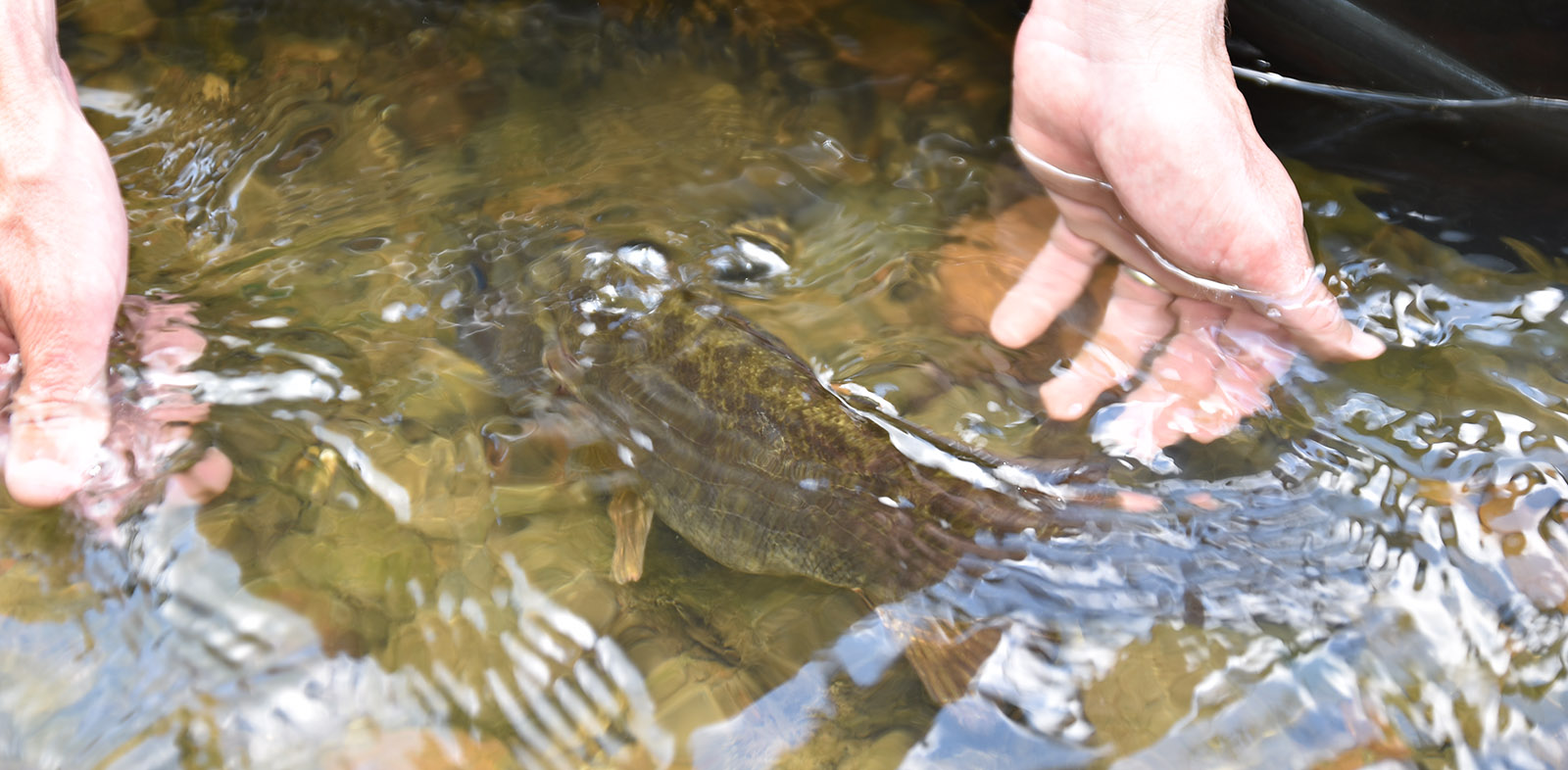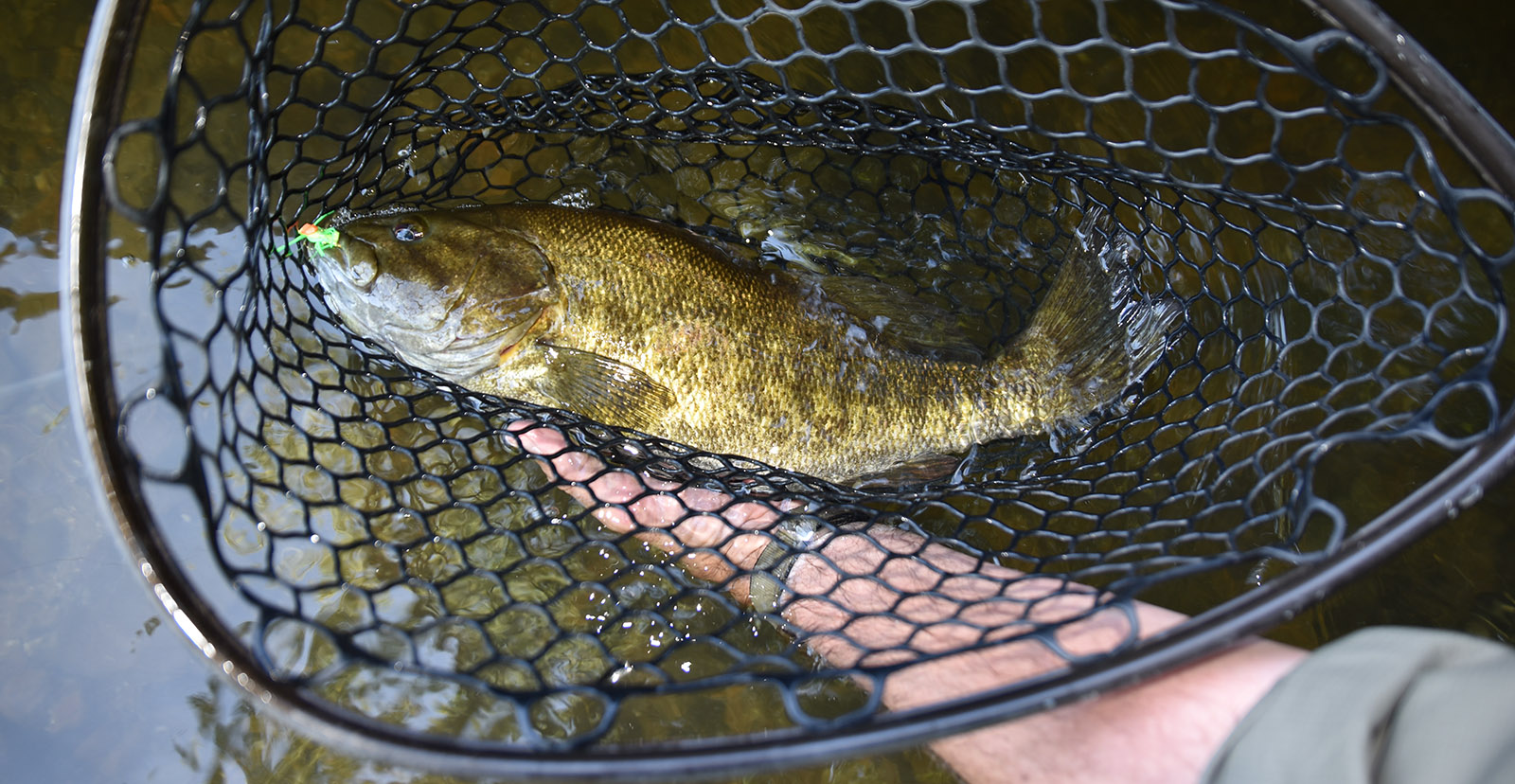By Bruce Ingram
Photos by Bruce Ingram
Many anglers know that cold-water species such as rainbow, brown, and brook trout potentially can experience greater mortality when caught and released when water temperatures surpass 70 degrees or even the upper 60s. But even common warm-water stream species such as smallmouth bass, rock bass, and redbreast sunfish likewise feel increased stress when water temperatures reach certain levels.
The Virginia Department of Wildlife Resources (DWR)’s District 2 Regional Fisheries Manager Scott Smith says that when water temperatures rise to the 85- to 87-degree temperature range, handling mortality of smallmouths increases substantially.
“Smallmouths are stressed anyway at these temperatures,” he said. “And every little additional stressor, whether it’s playing, landing, or handling the fish, adds up. The same bass caught and released successfully at 60 degrees of water temperature may not make it when caught at 85 degrees. Add in a fish being handled in an air temperature of 95 degrees, and you can understand why survivability is not good.”
Smith also debunked several of the most pervasive myths about releasing fish. One misconception is that a bass or any fish can be rocked back and forth in the water and thus revived.
“Holding a fish still and facing it into the current or moving it slowly forward can help a little,” he said. “But the gills of fish are not made to work backwards, so that rocking backward motion is definitely not recommended. Also, a fish bleeding from the gills or throat area and caught in overly warm water is not likely to survive. There may not be 100 percent mortality, but the odds of survival go way down.”

Releasing fish quickly can help keep them healthy.
Region 4 District Fisheries Biologist Jason Hallacher says anglers should consider implementing various strategies to minimize stress on warm-water stream species during the summer months.
“One of the most important things that fishermen can do is to minimize the time a bass or sunfish is out of the water,” he said. “For example, instead of bringing a fish into your boat, use a net to land the fish and release it right out of the net. Another thing anglers can do is to use barbless or circle hooks instead of treble hooks. Sometimes it’s much harder and takes longer to remove those multiple hooks out of a fish that is already stressed from higher water temperatures. That smallmouth may swim off afterwards, but that doesn’t mean it won’t suffer delayed mortality.
“Another thing anglers might consider doing is passing on those so-called hero or grip-and-grin shots. Or if a picture is taken, have it of the fish being in the water, in a net under the water, or being released. The goal always is to keep lactic acid from building up in the fish and eventually causing mortality.”

Keeping fish in or close to the water for photos, rather than hoisting them into the air, can help reduce post-catch mortality.
Hallacher added that in recent years, Virginia’s stream gamefish have experienced spring floods, summer droughts and high water temperatures, and extremely low, warm water come autumn. Many river anglers are confirmed catch-and-release enthusiasts who want to feel that the smallmouths they release can be caught again by others or themselves. Reducing stress on fish they land can increase the chances of those bass surviving and being caught again
Finally, Smith relates that another popular game fish that Virginia river anglers pursue is the muskellunge, or musky, which is even more vulnerable to warmer water conditions.
“Studies that show muskies often largely stop feeding when water temperatures rise to between 78 and 80 degrees,” he said. “And the ones that do feed and are caught and released have mortality rates of up 33 percent.
“That being said, the reduced catchability of muskies in warm water tends to counter-balance the increased mortality rate of those few fish that are caught. Thus, there really isn’t a population impact to musky from fishing in the summer. Smallmouth, on the other hand, do still actively feed in warm water, so even reducing survival rates by a few percentage points can have an impact when you consider the total number of people fishing these rivers every week all summer long.”


